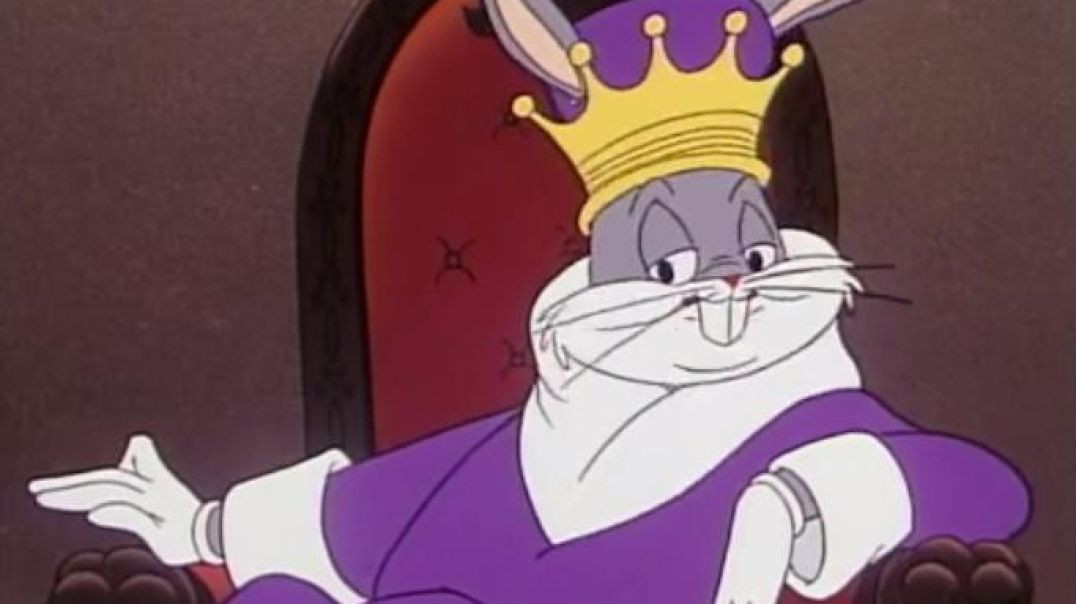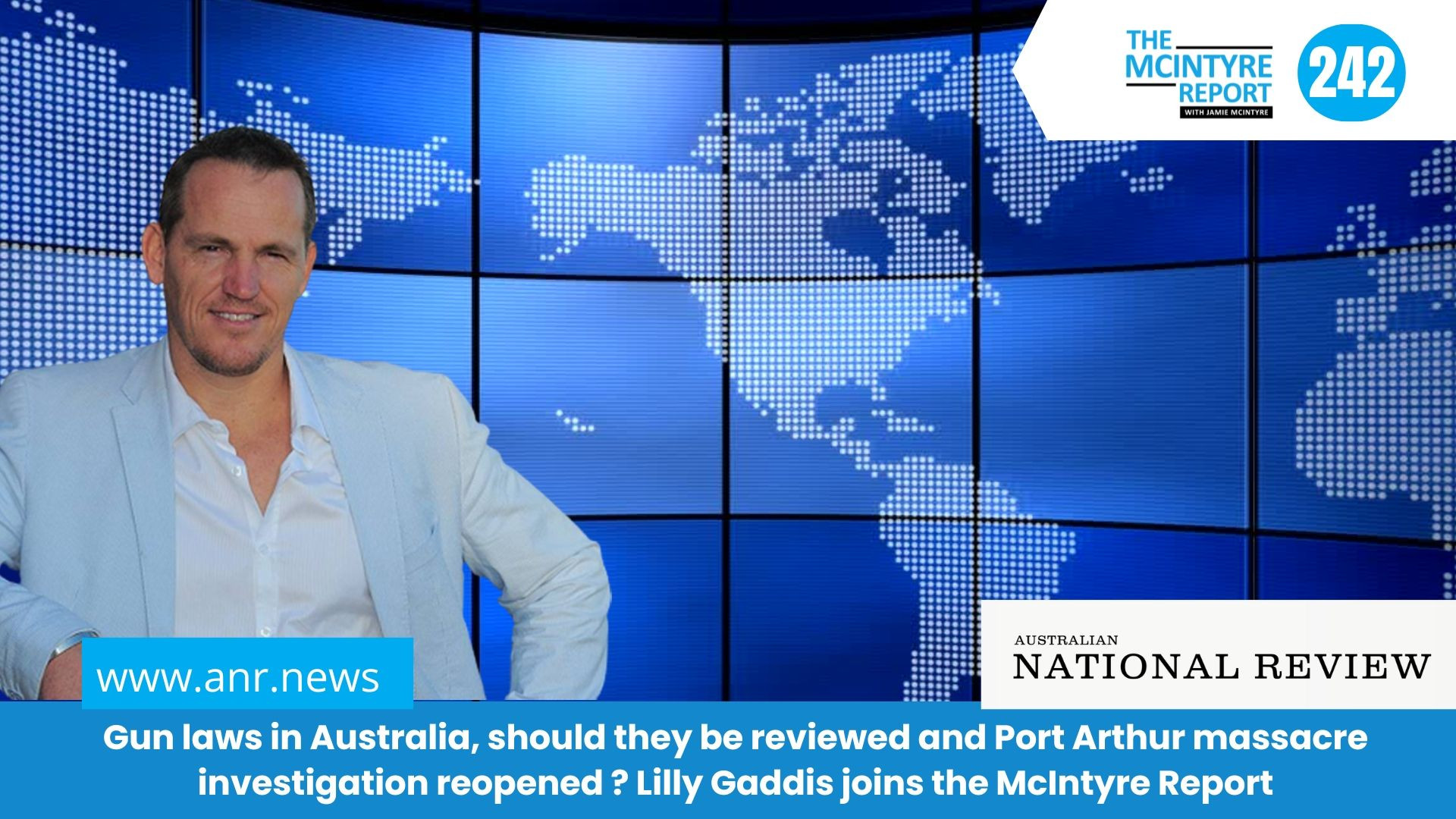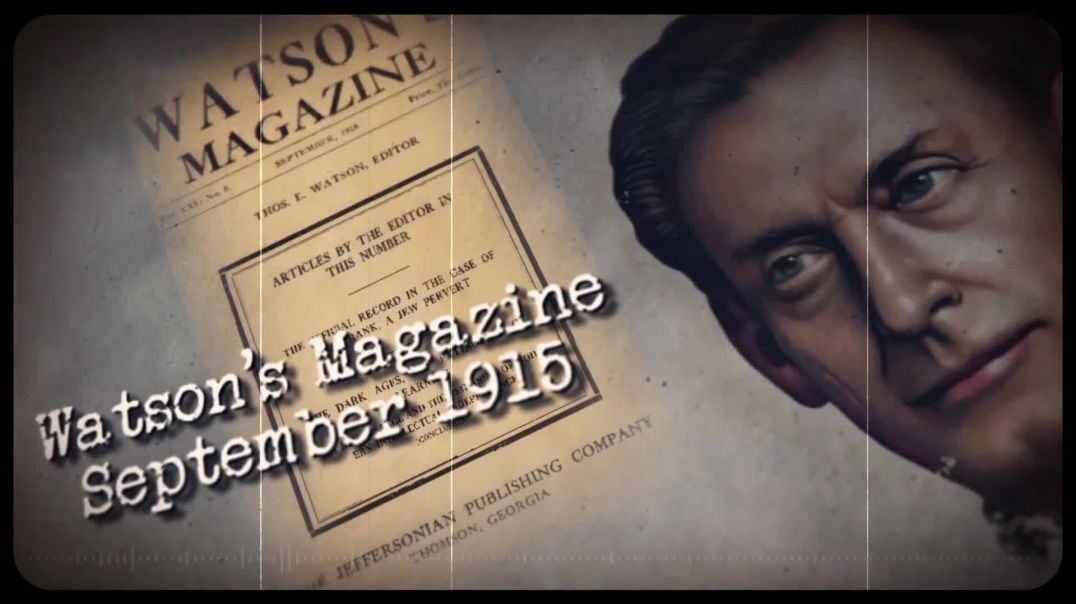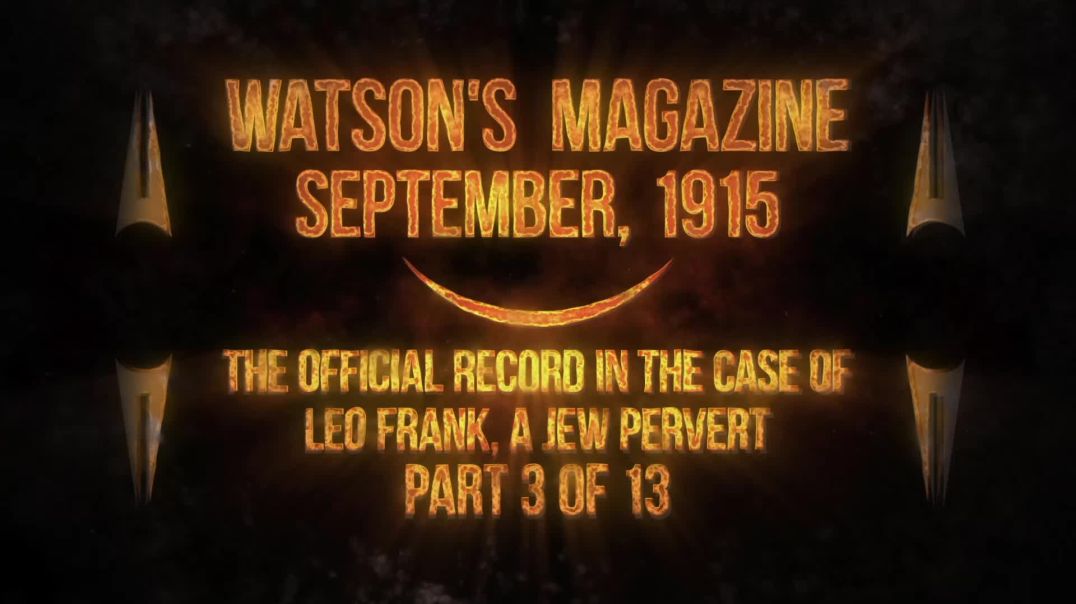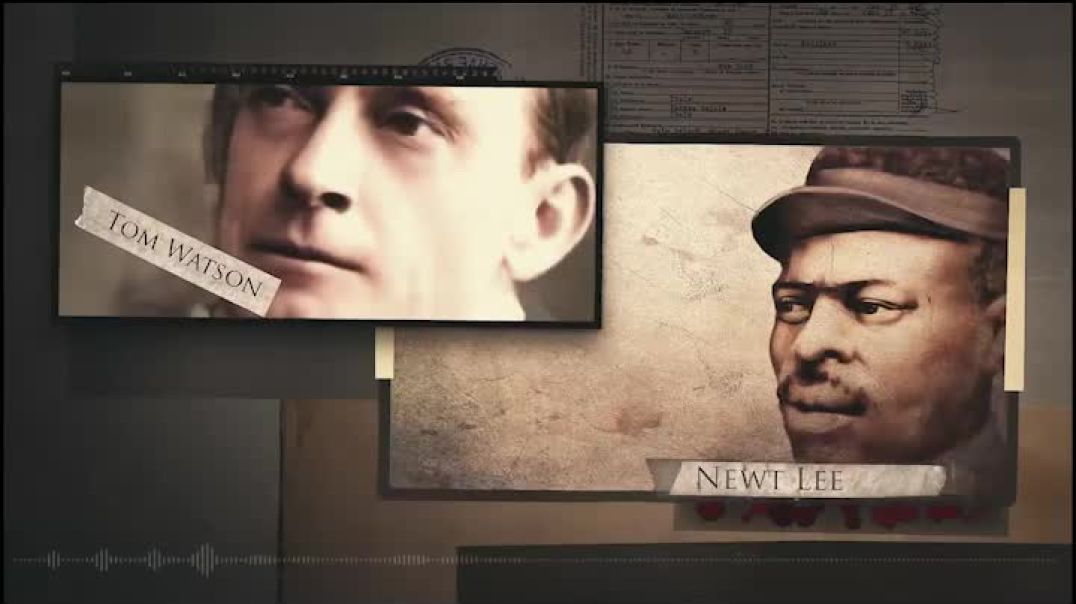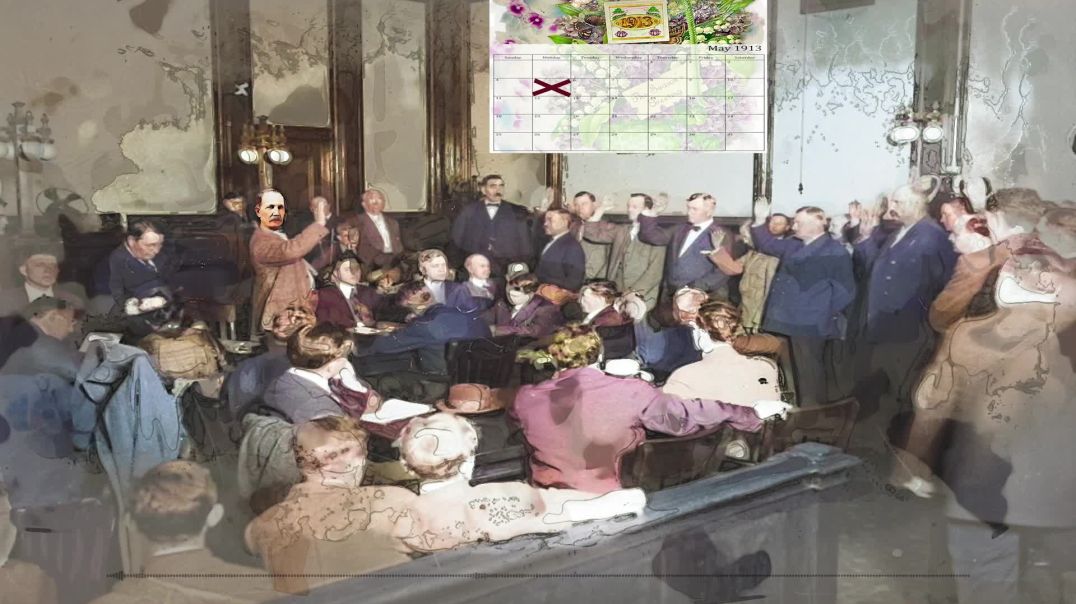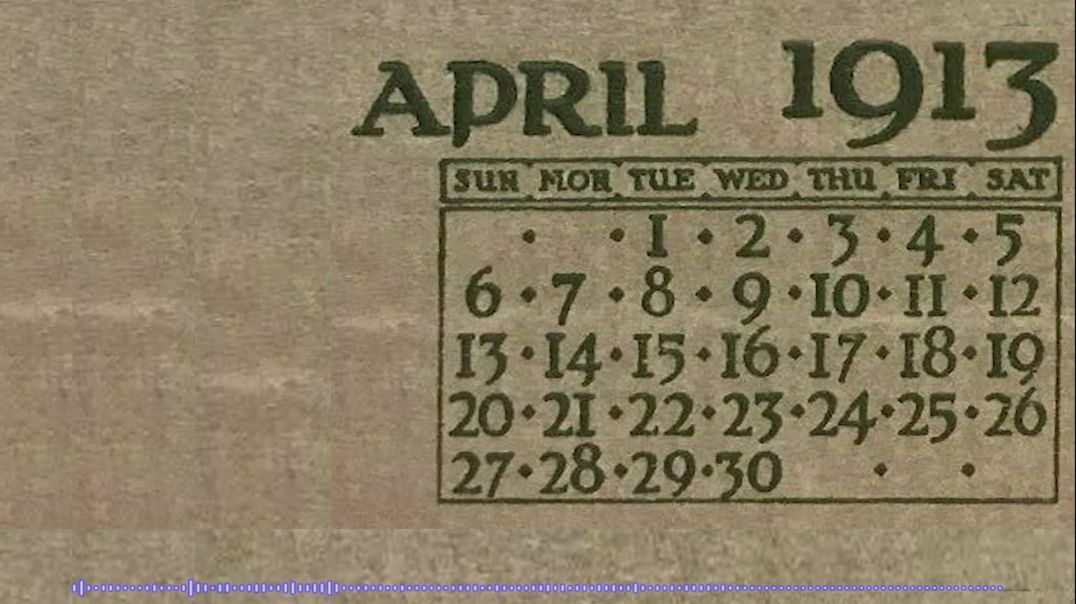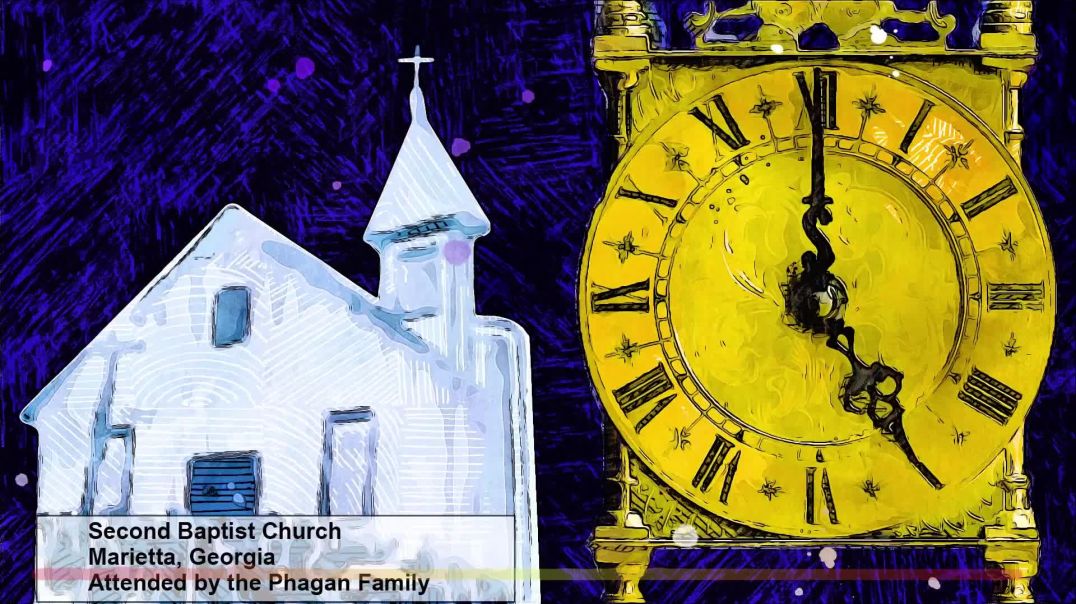Please donate now to help fund our work
- Film & Animation
- Music
- Pets & Animals
- Sports
- Travel & Events
- Gaming
- People & Blogs
- Comedy
- Entertainment
- News & Politics
- How-to & Style
- Non-profits & Activism
- McIntyre Report
- Jamie McIntyre uncensored
- RAW Report
- Candace Owens
- Steve Kirsch
- Tucker
- Bongino
- Elon musks
- Alan Jones Australia
- RT News
- Wayne Crouch Show
- Other
Leo Frank Trial - Frank Arthur Hooper Closing Arguments
On August 20, 1913, in front of the jury in the Fulton County superior court, Mr.Frank Arthur Hooper made his last statement on behalf of the State of Georgia. Hooper emphasized that it is up to the jury to determine guilt beyond a reasonable doubt and solely on the basis of the evidence that was put forth to them. The law is powerful enough to reach the highest position and bring the guilty down, as well as powerful enough to delve into the lowest level and bring the lowest to the highest, he further emphasized.
Furthermore, he emphasized that the prosecution is only seeking the truth—the whole truth—as required by the prosecution, not just any truth. Hooper also emphasized that the law is powerful enough to drag those who have broken the law down from the highest positions and up to the lowest. The factory was managed by Sig Montague as its boss, Frank as its superintendent, and Mr. Darley and Mr. Schiff as their assistants, according to this text's most crucial information. There are numerous accounts of his character from female factory workers that the defense has presented, but there are also tales of girls who left the factory as a result of his behavior.
When the first witness took the stand, the defense immediately revealed their strategies, outlining their goals in detail and even going so far as to present the evidence. The defense has revealed their strategies with the first witnesses called to testify, laying out their goals up front and even going so far as to present the evidence. The law is an odd thing. The legal process that could be used to sort the matter out is what's most crucial in this audiobook.
This character question, on the other hand, was one into which the defense, on the other hand, were allowed to let down the bars and walk in. It is argued that if 50 men were asked about the character of a certain place or man, and 25 or more say it is good, while as few as ten say it is bad, what is the character of that place or man? Dalton, who seems to have changed into a respectable man, and Frank had teamed up for a nightly meeting. This suggests that Dalton was not the kind of person needed by a dual personality like the one that existed in Frank. We all have two personalities, and when the evil one dominates, the person is bad, and vice versa.
According to numerous credible witnesses, Dalton appears to have triumphed over this bad and is now doing well. Frank is the manager of a factory that Mary Phagan is in charge of. He insists that he doesn't know Mary, but he frequently makes a stop at her workplace to assist her with her work. He pursues her off the beaten path, telling her about his superiority and enticing and convincing her. Every time he crosses the floor, he also glares lustfully at her. Jim Gantt, a friend of Mary's, serves as the first sign of his attitude toward his victim. Frank, who knew Mary and had his eye on her, asks Gantt, "You're pretty thick with Mary, aren't you?". Gantt must go, but Frank doesn't know how to do it.
The most significant information in this audio segment is that Jim Conley was the only man on either floor in the factory who knew Mary Phagan and who would raise a hand to protect her. Since Gantt was the only man on either floor who knew Mary Phagan and would defend her, he made plans to get rid of him. Jim Conley, who was comparable to Stone Mountain to some nearby highways, was the target of the defense's entire offensive strategy. After three and a half days, Rosser quizzed Negro on every topic he could think of. He quickly typed his answers onto the typewriter from the stenographer's notes, but they read like water being poured onto a mill wheel. His answers were hurried from the stenographer's notes and transcribed on typewriter, but it was like water poured onto a mill wheel.
All the intelligence and creativity in this town, this state, and the entire world combined couldn't compare to the truth. Once everything was said and done, they had no choice but to sit and let Jim tell it like it was. These two facts—that Jim Conley was a serial liar and that he returned that Saturday morning on Frank, his boss's orders—are the most crucial ones in this recorded transcript. Jim mentions keeping an eye out for these people after hearing that other people have seen women enter the factory at suspicious times with men.
The truth often comes out at the very last second, at the eleventh hour, thanks to Providence. The truth was stronger than all the brains and ingenuity that can be collected in this whole town, this state, the world. When all was through, they were forced to sit and leave Jim's truth unscathed. The most important details in this text are that Jim Conley was a big liar, and that he came back that Saturday morning by order of his boss, Frank. Other people have seen women enter the factory with men at suspicious hours, and Jim tells of watching for these folks. Providence has a way of revealing the truth at the final minute, at the 11th hour.
At the noon, Mary Phagan was murdered, and Jim Conley was seen sitting on the first floor near the door where he watched for Frank. Mrs. White saw a Negro in the position Jim tells us he was in. They say he was drunk, but he clearly recited incidents and told the names of people he saw at The Times. This brings us up to the time of the tragedy. Jim Conley and Frank are still in the building, and Frank knows that Mary Phagan was coming that day.
In violation of a plant policy, Mary's friend Helen Ferguson had called Frank the day before asking for Mary's pay and received the response that Mary Phagan should come pick up her own pay. While everything is happening, Jim just watches. Mary Phagan, who is lovely and innocent, shows up at last. She is wearing a blue dress, a new hat, and a ribbon in her hair. Frank claims that Monteen Stover, another young girl, was present when he was there from 12:00 to 01:00. From 12:00 until after, he remained in his office without ever realizing Monteen was there.
One stayed in Montana for five minutes without leaving. Leo Frank's virtual murder confession was summed up by Frank Arthur Hooper in one phrase. Leo Frank acknowledged that he may have left the room and gone somewhere else in the building, but he couldn't exactly recall. Jim Conley, who was obediently sitting downstairs, heard steps leading toward the middle room and then steps following. Leo stamped a signal on the floor of the office as the pursuer's footsteps cautiously retreated from the metal room. Jim Conley overheard a scream that sounded like a laugh that had been severed and turned into a shriek. Frank hadn't realized that using force would be necessary to achieve his goal. He was supposed to arrive on signal, but that scream was not a signal. Frank would later stomp on the office floor. The black man testifies before the jury that the white man killed the young girl while Frank was working on his financial sheet in his office according to the defense.
The diagram illustrating the proximity of the metal room to Frank's office lends credence to Mr. Hooper's theory that nothing could have occurred on the floor without Frank hearing or observing it. When the murder was finished, two men and a woman upstairs had to leave the building before the body was moved. They needed to leave because Frank was about to lock up the factory, so he went upstairs and told them that. This demonstrates his appreciation for a young girl of 14 who had come to draw her pay editor's note, as Frank was doing when Mrs. Arthur White arrived, as he was writing at his desk while still wearing the sleeves of his shirt, "Why should I hang.".
Then, Frank assures Jim that he will look after him and write a letter to his mother so she can assist him. The most crucial information in this passage concerns Frank's intelligence and Jim's lack of it, as well as his expectation that Jim Conley and Newt Lee will show up at the pencil factory to burn Little Mary's body. Frank is anticipating the arrival of Jim Conley and Newt Lee at the pencil factory; the outcome would depend on which one arrives first and decides how the body will be handled if Jim arrived first. It is implied that this is the only time clever Frank has ever lost his head. When the defendant pondered which army would arrive first and knew that the answer would determine whether or not his side would win the Battle of Waterloo, he was in Napoleon's position. That afternoon, Newt Lee arrived at the pencil factory, but Jim Conley wasn't there.
Jim might still show up and burn the body as agreed upon, so he sent Newt on his way in the vain hope that he would. After waiting for two hours for Jim Conley, Newt returned and spoke with him about the previous night's work. The defendant came across an elderly, long-legged Gantt who was searching for his shoes as he left the factory. According to witnesses, the defendant reacted startledly when he saw Gantt and jumped back.
Gantt was fired by Frank after a dispute over who would pay the nominal fee of $1, when Frank had called him to discuss setting up a wedding. He didn't believe Gantt stole that meager dollar; instead, he anticipated that he would inquire as to Mary Phagan's whereabouts. When the defendant saw Gantt, he recoiled. Gantt informed the defendant that he had left a pair of shoes at the factory and had come to retrieve them. The defendant believed he had seen a ninja removing Gantt's shoes from the structure. There were two pairs of shoes in there, according to Gantt, and perhaps one pair wasn't swept out. The accused consented to let Gantt inside but insisted that he be guarded like a thief. Just as he claimed, Gantt found both pairs of shoes. He phoned the factory after letting Gantt in to see if he had left and if anyone had noticed after Gantt entered. When he realized Gantt had left safely and everything was fine, he felt fine and relieved. The fact that Newt Lee discovered Mary Phagan's body and called the police is the most crucial information in this passage. When he mentioned it in court, Detective Starnes was confused, but he never forgot it.
Frank expressed anxiety as he was being led to the morgue and claimed he believed the victim was a girl he had paid off the day before. He was tense as a cat that morning and offered no solace. Having spent weeks in the courtroom, Detective Starnes is tense. He claimed he believed it was a girl he saw and spoke to every day while trembling like a cat that morning. The events leading up to Newt Lee's arrest are the most crucial details in this section of the audiobook. He reasoned that he needed to look at the time slip when he was taken to the basement and brought back upstairs. Others agreed with him after he examined the slip and claimed it had been punched correctly. When police officer Black arrived at Newt Lee's house, he discovered a bloody shirt at the bottom of the storage container, surrounded by a lot of other items. Police Officer Black visited Newt Lee's house because he had some unfounded suspicions, and there he discovered a bloody shirt at the bottom of a barrel with numerous items piled on top of it. Newt Lee is free and is not under suspicion.
It had to be planted; it was planted, the bloody shirt. The two jury-made suggestions are the two most significant details in this text. The first is that Newt Lee had to be the target of suspicion if he was to be used as the scapegoat. The second is that Frank didn't try to fix it on Jim Conley when he was discovered washing a shirt before the trial. The third is that cunning Pinkerton investigators discovered a large bloody stick and a piece of an envelope. Conley refused when asked if Mincy had admitted to him that he was the person who killed the girl, which brings us to our fourth point. Fifth, Frank would be freed if Conley could persuade the jury that Jim confessed to him about the murder. The only belief required of the jurors, according to the speaker, is equivalent to the belief they would hold if they were out in public or at home. In the jury room, they are expected to behave naturally and rationally. The speaker wants to use up less of their time because this testimony has been lengthy.

